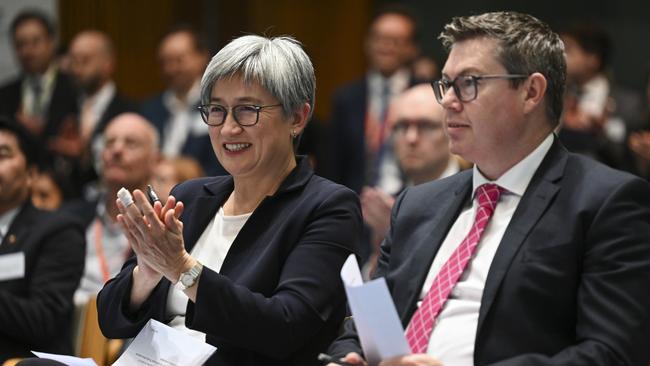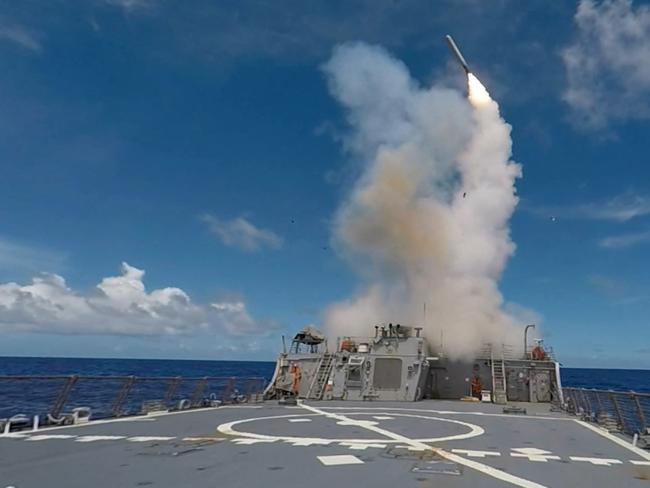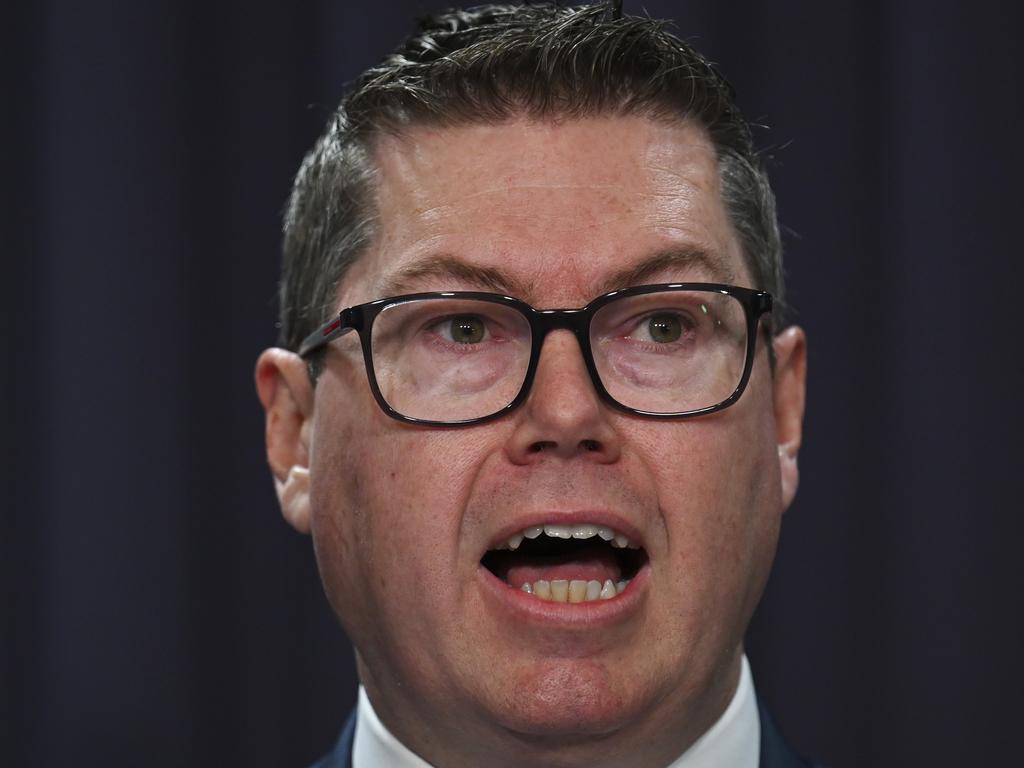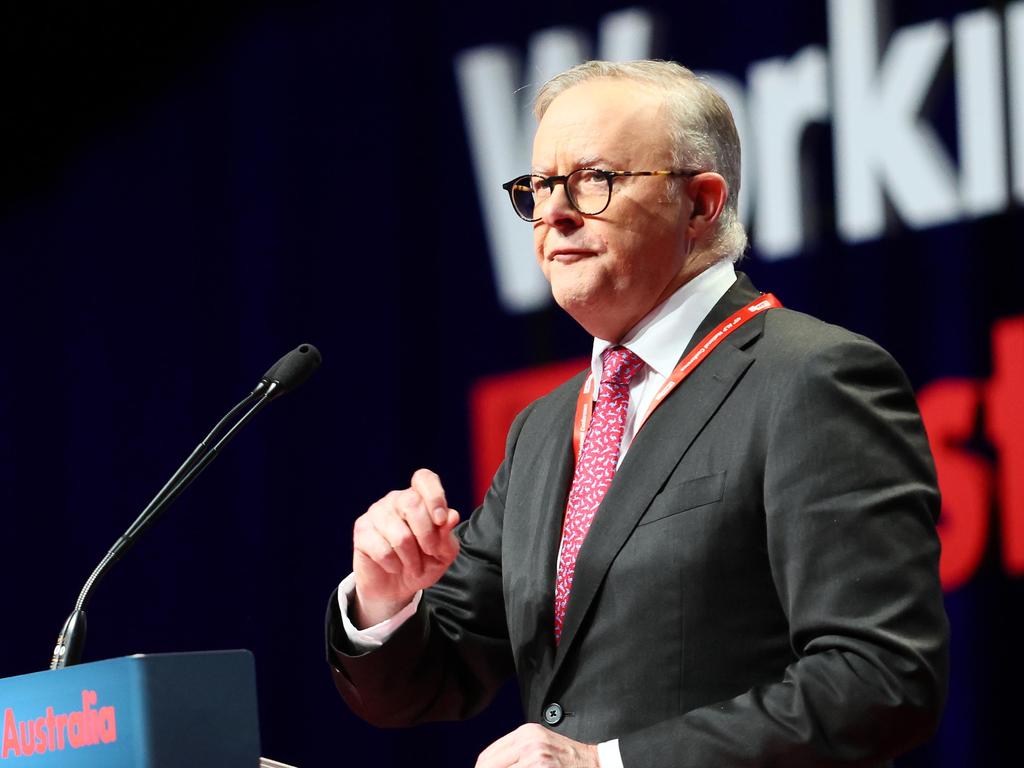Cruise missiles to land in $1.7bn deal as China warns on AUKUS
Australia’s most potent naval ships will be able to strike land targets 1500km away under a $1.7bn deal to purchase cruise missile systems from the US.

Australia’s most potent naval ships will be able to strike land targets 1500km away under a $1.7bn deal to purchase cruise missile systems from the US.
As China warns AUKUS partners against using the military partnership to target the communist nation, the government is unveiling a deal that includes the $1.3bn purchase of 200 Tomahawk cruise missiles, giving Australian navy boats a “world-leading” shooting capability.
The government is paying $430m for 60 anti-radiation guided missiles, which will provide aircraft with “sophisticated technologies to identify, locate and engage land-based targets”.
There is also a $50m investment to increase the missile range of the army’s Boxer combat reconnaissance vehicles.
The deal – recommended in this year’s Defence Strategic Review – will be outlined on Monday by Defence Minister Richard Marles and Defence Industry Minister Pat Conroy, days after they warned the AUKUS pact was essential to counter the military build-up and strategic ambitions of China.
In a separate development over the weekend, US congress agreed to sell 22 mobile rocket launchers to the Albanese government, more than doubling the army’s stocks of the devices used to shoot missiles from trucks. Mr Marles said the government made the investments to “hold our adversaries at risk further from our shores and keep Australians safe in the complex and uncertain world in which we live today”.
Mr Conroy said the purchase allowed the government to deliver capability quickly, but the longer-term plan was to manufacture missiles in Australia.
Strategic Analysis Australia director Michael Shoebridge said the deal was “realising Australia was living in the missile age”.

“The number and type of missiles in the Australian defence inventory is quite small so we would run out in any serious conflict within days,” Mr Shoebridge said.
“In a wider war in the region involving all our allies and China, they would be a sensible contribution and that is why they are part of deterring China.”
During the debate about AUKUS at Labor’s national conference last week – where the party formally backed the military pact and nuclear submarines – Mr Marles and Mr Conroy warned China would have 21 nuclear submarines and 200 major warships in the water by 2030.
In a major slapdown of Beijing, Mr Conroy said it was against Australia’s interest to have “one power dominate our region, especially one that breaches international laws”.
“Strength deters war,” he told the national conference.
Responding on Sunday, a Chinese embassy spokesman said bilateral or multilateral defence agreements should be “conducive to world peace and stability, and not target any third party or harm others’ interests”.
On Sunday, Foreign Minister Penny Wong conceded not all workers on the submarine projects would be members of unions, despite the party platform vowing to support thousands of “well-paid unionised jobs” through the AUKUS deal.
Australian Manufacturing Workers Union Victoria secretary Tony Mavromatis said Senator Wong should be backing union jobs for the submarine projects.
“Penny Wong probably needs to be reminded it is the unions that support the ALP,” he said.
“All workers enjoy the benefits of the union movement and they should participate in it to support their conditions and entitlements.
“My understanding of the agreement is it will create good jobs and union jobs.”
Mr Mavromatis said unions would be keeping a very close eye on whether the government keeps its jobs pledge for the AUKUS program, as other union leaders vow to continue to oppose the deal.
“We will be watching how it all unfolds and making sure Australian jobs are participating in the build of AUKUS until they start building them in South Australia,” he said.
Mr Conroy stunned Labor delegates in his Friday speech by accusing those opposed to AUKUS of following a “Robert Menzies appeasement” strategy.
Left-leaning delegates and unionists said they were ropeable over Mr Conroy’s speech, which was described as “unnecessary” and “beyond the pale”.
“It was clear (Mr Conroy) was debating against Paul Keating. Those comments were for him,” one union source said.
“This was an audition to be (Anthony) Albanese’s spear carrier and it did not go well. The speech he gave angered people, it has become a focus point around … anti-AUKUS sentiment.”
Another source told The Australian that while the Labor Party had settled on its platform position on AUKUS through the conference process, Mr Conroy would likely encounter pushback from Left-aligned unions on other issues following his incendiary remarks.
“If he goes looking for support from parts of the Left on other … things, they’d probably tell him to get nicked,” the union source said.
“Maybe he needs reminding he’s from the Left. To be honest, our union won’t forget this.”
Mr Conroy’s argument that any concerns aired over AUKUS equated to “appeasement” was met with outrage on the national conference floor on Friday, with Electrical Trade Union national secretary Michael Wright slamming the Defence Industry Minister for executing an “ad hominem, sloganeering debate”.
While Mr Wright had initially waived his right to speak after Mr Conroy’s address, the powerful union leader said he was unable to let go the inference that he and his union were akin to Menzies and Neville Chamberlain.
“These sorts of ad hominem, sloganeering attacks do nothing to elevate the debate and do nothing to deliver close to resolution,” he said.
Fremantle MP Josh Wilson – who spoke in favour of reference to nuclear submarines being removed from the platform – told delegates the accusation those raising concern about AUKUS were appeasers was “ridiculous”.
Peter Dean, lead author of the Defence Strategic Review and director of foreign policy at the United States Studies Centre, said the AUKUS debate and resolution at the conference was a significant moment.
Professor Dean said it showed the world the Labor Party platform, not just the Albanese government, was behind AUKUS.
“It has shown we are now in a new era in Labor defence policy. There’s new Labor values that have been firmly hammered home, specifically the acceptance of nuclear submarines as a core part of deterrence,” he told The Australian. “That’s big thing for a party that has in the past been against nuclear in all forms.”







To join the conversation, please log in. Don't have an account? Register
Join the conversation, you are commenting as Logout